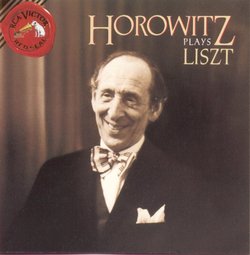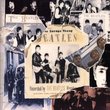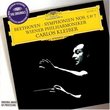| All Artists: Franz Liszt, Vladimir Horowitz Title: Horowitz Plays Liszt Members Wishing: 0 Total Copies: 0 Label: RCA Release Date: 6/8/1993 Genre: Classical Styles: Forms & Genres, Ballads, Short Forms, Sonatas, Historical Periods, Modern, 20th, & 21st Century, Romantic (c.1820-1910), Instruments, Keyboard Number of Discs: 1 SwapaCD Credits: 1 UPC: 090266141524 |
Search - Franz Liszt, Vladimir Horowitz :: Horowitz Plays Liszt
 | Franz Liszt, Vladimir Horowitz Horowitz Plays Liszt Genre: Classical
It's a pity that RCA didn't wait until 1978 to record Vladimir Horowitz' shattering Liszt Sonata, rather than issuing this live performance from 1976. Horowitz had just reacquired the work, and its demanding figurations cl... more » |
Larger Image |
CD DetailsSynopsis
Amazon.com It's a pity that RCA didn't wait until 1978 to record Vladimir Horowitz' shattering Liszt Sonata, rather than issuing this live performance from 1976. Horowitz had just reacquired the work, and its demanding figurations clearly had not settled in all in way. Still, Liszt and Horowitz' heroic voices ring true. The pianist packs everything but the kitchen sink into Mephisto Waltz, adding Busoni's embellishments and a coda of his own devising. By contrast, the gentle Consolation soars with simplicity. For prime Horowitz, turn to his classic 1950 Funérailles, where his big vision and demonic flair prevent the music from becoming a mere octave etude. --Dan Davis Similarly Requested CDs
|
CD ReviewsAgony & Ecstasy Robert J. Sullivan Jr. | Chicago, IL USA | 11/14/2001 (4 out of 5 stars) "This is a very mixed bag. Only the "Funérailles" (1950) shows Horowitz in his prime; the rest of the selections date from 1977-81, a period when his technical control (and sometimes his taste) frequently deserted him. The huge sonorities in the Sonata are betrayed by clotted rhythms - the all important flow between titanic climax and cantabile is often ragged. Snatches of coherent narrative are punctuated by indulgent tonal noodlings. There's a really bad splice at 2:03 of the Sonata; after that he seems to gather his resources and achieves some stunning effects, mostly of the fff variety.The Ballade is a slight improvement; the live acoustic has a powerful resonance (try the climaxes around the ninth minute). Horowitz confided that parallel scales were a weak point in his technique. So, his unison isn't perfect, but he is fearless in the ascending runs of the Ballade. The Mephisto Waltz concludes with an embarrassing pastiche of codas - the final chord may have been struck with Horowitz's elbow. The audience goes wild, of course. Horowitz's "Funérailles" is great pianism. From the stricken opening chords to the primal accelerando that takes hold of the left hand octaves, this is probably the finest rendition ever recorded." Lightyears away in pianism alan | Atlanta, Georgia United States | 07/31/2002 (5 out of 5 stars) "Reading these other reviews makes me ill! I have listened to 8 different versions of Liszt's piano sonata in b minor and not one of them, not Martha Agreich, not rubenstein, not brendel, no one can come within a mile of this recording. This is the greatest recording of the Liszt sonata. I hear no staggering rhythms but certain things he does for effect. It is the most powerful and haunting recording I have ever heard! Around the 20 minute mark he reaches an extreme musicality that no one else can come even close to reaching. The final coda is also breath taking with its alarming and ear wrenching volume and overwhelming pianism. But Horowitz was just as great a light pp performer that he was a loud ffff performer. The third movement is enoough to make me cry openly, and when he reaches that beautiful climax it makes my heart jump into my throat. The cheif editor of this CD, well your an idiot and should be fired for your misleading comments. I have been studying music for many years now and have never come across a greater performer than Horowitz. It only confirms my convictions that he is the greatest who has ever lived. I am obviously very smitten with the man but that does not blind me of his weaknesses, the weaknesses that are few in number and that every other pianist has. The modern pianist today make me sick to the core with their "stylish" playing. What the hell does "stylish" mean? Your playing a beautiful instrument and above all music. Unlike Horowitz many performers get in the way of the music rather than let the music control them. And this is what Horowitz does best. The Ballade and Mephisto waltz are mind blowing too with a great Mephisto waltz ending and great sections to be heard in the Ballade. The Funerallias is very old but brilliance sure can be heard! If only people would study the sheet music before they criticised this brilliant artist maybe he'd grow greater acclaim than the timid Rubinstein. Oh and give the guy a break he was in his seventies when he recorded these, not bad for an old man as he puts it. Coming from an expert on pianism, BUY THIS CD! OR ANY HOROWITZ CD!" This Horowitz CD presents two important recordings. KNCE@aol.com Kevin Wilson | California | 01/01/1999 (4 out of 5 stars) "For the Horowitz lover or the Liszt devotee, this CD presents two important recordings. First, from Horowitz's late period, is the Ballade No.2 (1981). None of his late recordings better displays his legendary dynamics, tone coloring and melodic lines than the beautiful pianism in the Ballade. Second, from the period shortly before his "retirement", comes his justly famous performance of the Funerailles (1950). The titanic, octave-pounding, super-bravura style of Anton Rubenstein demonstrates the immense "sound" and emotion that made the young Horowitz world famous. The rest of the disc offers lesser performances from his later years, during noticeable periods when his technical skills had declined temporarily. The best all- Liszt CD available is Jorge Bolet's recording, "Franz Liszt, Favorite Recordings" (London, 2CD set): superb throughout, unmatched in the over-all scope of the pianism."
|

 Track Listings (5) - Disc #1
Track Listings (5) - Disc #1








